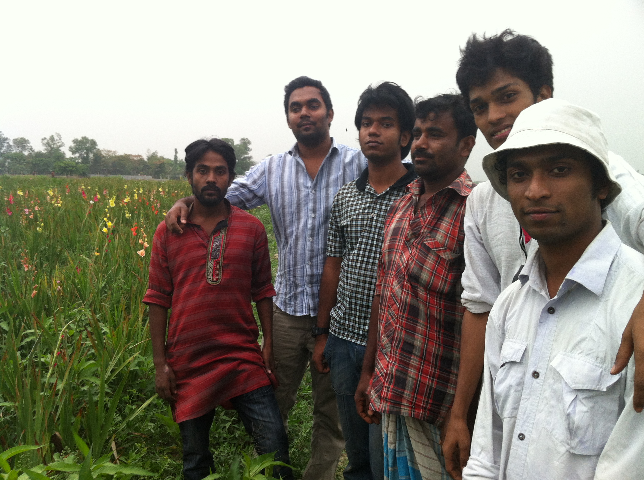-
About
- Our Work
- Get Involved
- Stay Updated
Cash Crop Cultivation Brings Smiles to the Farmers: Revealed from A Field Visit of YPARDians of UODA
 On a sunny day of spring, YPARDians, students from the Department of Biotechnology & Genetic Engineering and Department of Molecular Medicine & Bioinformatics, lead by F.M. Safiul Azam from UODA had a visit to farmers` field to learn detail about agricultural practices and crop-profit status of horticulture.
On a sunny day of spring, YPARDians, students from the Department of Biotechnology & Genetic Engineering and Department of Molecular Medicine & Bioinformatics, lead by F.M. Safiul Azam from UODA had a visit to farmers` field to learn detail about agricultural practices and crop-profit status of horticulture.They have visited fields of Taro and Gladiolus, which are one of the major crops in Savar sub-district in Dhaka district. It was their first experience to learn from Taro cultivators. The farmers were very amazed to see youth`s interest on their crops and their courage of learning from the field.
Students asked to the growers to share their view of cultivating the Taro. On question of profit from Taro, the farmer replied to M. Hasenur Reza, a student of UODA, that those who can cultivate Colocais esculenta which can produce stolons have the greater income but require sufficient irrigation facility. The current plantlets were small and 2-3 feet in height in the fields and the growth will be faster when monsoon starts.
One of the most interesting and new idea we found during the visit is that the roadsides of the villages are planted with eggplants. It was amazing to see fruit bearing eggplants with ripe and unripe fruits in the roads.
In the last section, during the afternoon while crossing the river Bongshi, we dropped onto an island and visited a beautiful land of Gladiolus flower. All of us were amazed to see such a field of three acres own by Mr. Arfan, who has also felt interested to describe his stories and field experiences of Gladiolus to the students.
From a question of Safiul Islam, he replied that it is his third consecutive year of cultivating gladiolus in the island. The interesting fact is that the island goes under river during rainy season and arose again in winter. He cultivates flower only in the winter where it was previously used for potato and winter vegetable production by other farmers.
He added that he made the first attempt in the area to cultivate cash crops like gladiolus in the island and now several farmers are following his practice. In comparison of profit, flower cultivation brings 20 times higher than winter vegetables Mr. Arfan replied to Md. Sayeed of us. He also added The initial costing for this culture is 3500-4000$ for per acre. A total of 0.8 to 0.9 million bulbs per acre are needed for this plantation and it begins flowering after 75-80 days. He produces flower only for six months and profits 1000$ from per acre. He shared to Mehedi Hasan that 55000-65000 sticks are produced from an acre and could sell 75$ per thousand to the whole seller.
Usually, he does not plant bulbs at a time. He goes for batch production for every season, and that is why firstly he develops plantlets in a seedbed. And, then he transplants the seedlings by one month for an acre and complete by three phages.
He said that this strategy of cultivating cash crops brings profit for the growers in the area. In response to a question regarding disease and pest from Asif Rahman, he said that they have to struggle with a disease which is causing 35-40% loss of plants.
Later, identification was made at the laboratory from the samples taken from the field which resulted that it was fusarium wilt that severely affect the region.
The YPARD team is now dealing with the solutions and disease management support from the University to the farmers against the wilting. Another YPARDian Ataur Rahman stated that they would like have more regular visits in future to learn from the grass-root level.
Tags:About the author
Related Posts
Comments
No comments made yet. Be the first to submit a commentBy accepting you will be accessing a service provided by a third-party external to https://www.ypard.net/
Get in touch
Email: [email protected]
YPARD Global Coordination UnitHosted by AGRIDEA and the Czech University of Life Sciences Prague
Lausanne, Switzerland and Prague, Czech Republic - Our Work

 On a sunny day of spring, YPARDians, students from the Department of Biotechnology & Genetic Engineering and Department of Molecular Medicine & Bioinformatics, lead by F.M. Safiul Azam from UODA had a visit to farmers` field to learn detail about agricultural practices and crop-profit status of horticulture.
On a sunny day of spring, YPARDians, students from the Department of Biotechnology & Genetic Engineering and Department of Molecular Medicine & Bioinformatics, lead by F.M. Safiul Azam from UODA had a visit to farmers` field to learn detail about agricultural practices and crop-profit status of horticulture.